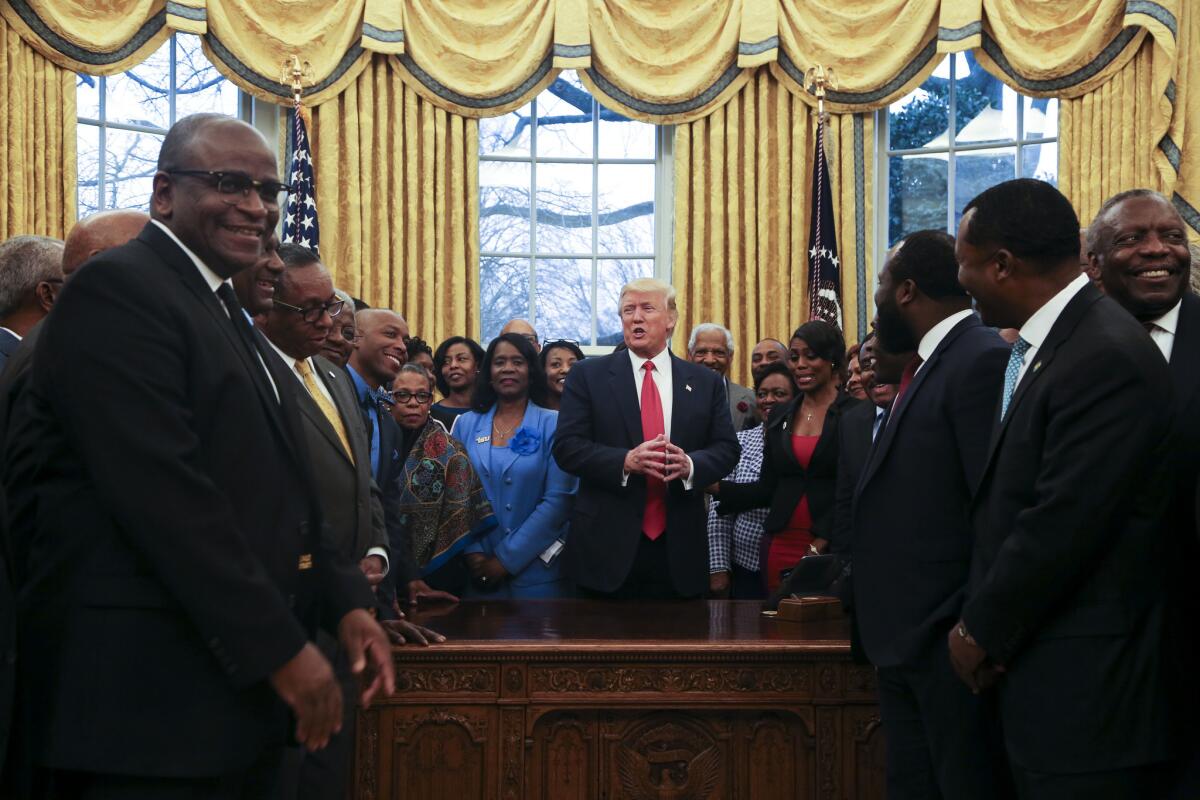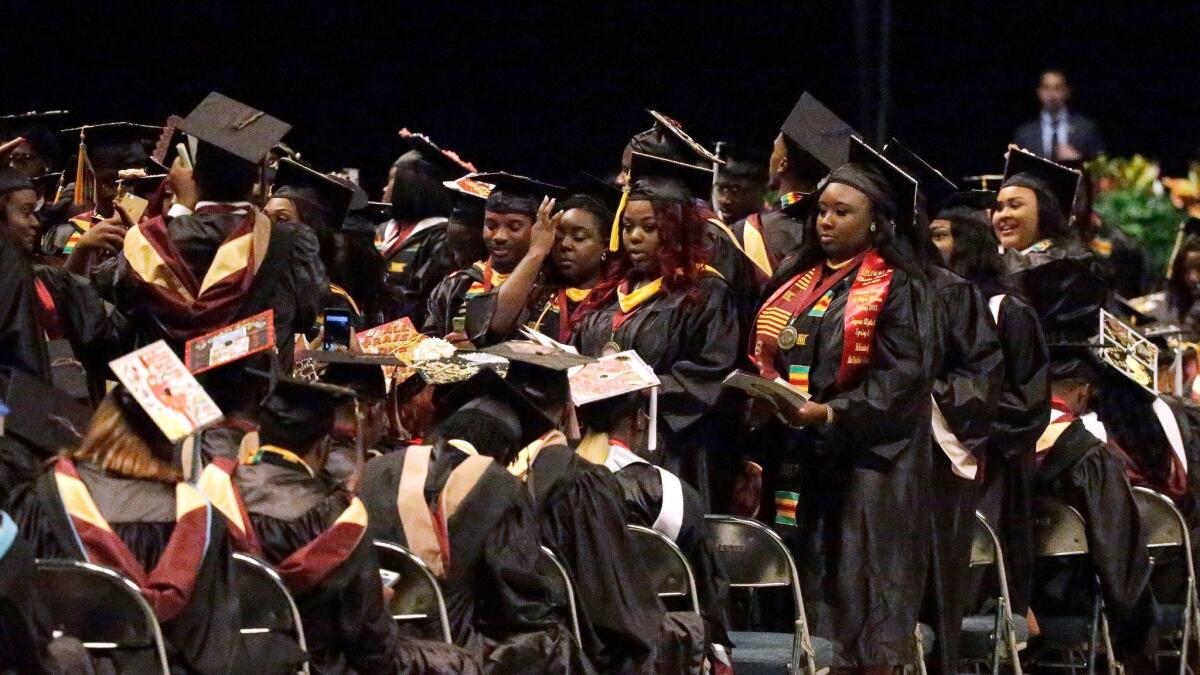Historically black colleges view Trump administration warily, but also with some optimism

- Share via
Since taking office, President Trump has pledged “unwavering support” for the critical educational missions of historically black colleges and universities, invited leaders of those institutions to the White House and even dispatched his Education secretary to deliver her first commencement address of graduation season at one of the schools.
The moves, by a president who won just 8% of the black vote in November, have surprised and pleased some African American educators, who say Trump already has outpaced the steps taken by previous administrations, including that of the nation’s first black president.
While some leaders and groups associated with black colleges have welcomed the young administration’s overtures, others, notably students, remain wary of Trump and assail the White House as tone-deaf and insensitive. Those views were on display this month when Education Secretary Betsy DeVos delivered the commencement address at Bethune-Cookman University in Daytona Beach, Fla. As DeVos began to speak, students booed and turned their backs on her.
Following his inauguration, Trump’s most overt outreach to African Americans has been his efforts to woo students and leaders of black colleges that were founded in the years after the Civil War and today consist of 101 public and private schools nationwide.
“For [President] Obama, people expected him to come in and fix everything — especially for black people.… But he never campaigned strongly for HBCUs,” said Walter Kimbrough, president of Dillard University in New Orleans, using the common abbreviation for the schools.
Now, he says, the reverse has happened — Trump came in with no expectations placed on him, and some black educators have been pleasantly surprised. “So people now want to see what’s going to happen because he’s coming in saying he’s going to be the president for HBCUs,” Kimbrough added. “It’s a very different perspective, but it’s still the first 150 days, so we’ll see what happens.”
Johnny C. Taylor Jr., president of the Thurgood Marshall College Fund, a nonprofit that helps provide financial assistance to students who attend black colleges, says the signs from the White House are encouraging.
“In the first four months of this presidency, the Trump administration has been far more responsive to our community than the past administration,” Taylor said. “I, for one, judge people by what they do — not what they say.”
Taylor points to, among other things, the bipartisan spending bill Congress passed and Trump signed this month, which includes an expansion of Pell grant eligibility to year-round. (In recent years, Obama signed budgets that only allowed Pell grants to be used for two semesters in a school year.)
Moreover, Taylor says, Trump’s own budget proposal left funding for black colleges and universities untouched, even as it proposed slashing the Department of Education budget 13.5%.
“Level funding is a win for HBCUs in a season where large cuts were made across the board,” said Taylor, who has penned op-eds lauding Congress and the Trump administration’s work on behalf of black colleges.

Historically black colleges and universities are located primarily in Southern and Midwestern states and in 2015 enrolled nearly 300,000 students, according to the National Center for Education Statistics. In recent years, many black colleges, which educate students of all races and ethnicities, have struggled to bolster enrollment and graduation rates.
Rick Gallot, president of Grambling State University in rural Louisiana, says it’s important for leaders of black colleges to forge bonds with Trump’s administration, including with DeVos.
“For me, there’s no real emotional attachment to this administration.… But the question is how do we continue to build relationships with this administration?” said Gallot, a former Democratic state lawmaker. “The recent action by the Congress and the White House does reflect an increase in Pell funding — that’s a positive.”
Still, Trump’s characterization of black America — while campaigning he repeatedly said African Americans are “living in hell” — along with the racial discrimination lawsuits his businesses faced in the 1970s, have made some students and faculty skeptical.
And with the rise of the Black Lives Matter movement, created by young activists, the colleges now must navigate a precarious balancing act — being responsive to their students, while not shunning a potential ally in Washington.
Vocal and often angry students quickly point to missteps by the White House.
In February, after DeVos and Trump met with black college leaders, DeVos released a statement calling the institutions “pioneers when it comes to school choice.”
Critics castigated her as ignorant, noting the schools were established to combat racism and segregation.
DeVos later walked back those comments in a series of tweets, saying black schools “remain at the forefront of opening doors that had previously been closed to so many.”
A day after the meeting, Trump signed an executive order moving oversight of an initiative on historically black colleges and universities — which dates back to the Carter administration and, among other things, helps schools access federally sponsored programs — from the purview of the Department of Education to the White House.
Critics called the order symbolic and expressed more dismay when Trump, on signing the spending bill May 5, included a signing statement that seemed to suggest the federal government could not earmark funds for black colleges.
Reps. John Conyers Jr. (D-Mich.) and Cedric L. Richmond (D-La.), chairman of the Congressional Black Caucus, called the statement “stunningly careless and divisive,” especially for a “president who pledged to reach out to African Americans and other minorities.”
The White House later said it had no intention of withholding funds from black colleges.
Earlier this month, thousands of students and alumni signed a petition urging the administrators at Bethune-Cookman to cancel DeVos’ appearance. The university declined.
“It was blatantly disrespectful to have her there,” said Kaylin Johnson, 21, who studied political science and was among those to protest DeVos. “Her comments about HBCUs being about ‘school choice,’ and her clear support for Trump … I mean, she had no business being at our school.”
Johnson said administrators at the university could have prevented the protests if they listened to students and alumni. “It seems like it was for the money and a relationship,” with the Trump administration, Johnson said. “Trump and this administration have disrespected the black community and this country.”
In response to a student petition, leaders at Texas Southern University, a black college in Houston, this month canceled a commencement address by U.S. Sen. John Cornyn, a Texas Republican and Trump supporter.
“Every consideration is made to ensure that our student’s graduation day is a celebratory occasion and one they will remember positively for years to come,” the school said, adding that Cornyn was welcome to visit the school at another time.
Kimbrough, the Dillard University president, said that while a working relationship with the White House is beneficial, relationships with members of Congress are more important.
“A lot of the work we need done is happening through Congress,” he said. “Still, it is interesting to see Trump saying more about HBCUs than Bush or Obama did early on.”
Asked if he would have had invited a member of Trump’s administration to speak to students, Kimbrough said he would not.
“There’s a certain climate in this country and a broad distrust of the Trump administration among blacks,” he said following Dillard’s May 13 graduation in which the Grammy-nominated singer Janelle Monáe addressed students. “Commencement is a time of celebration, not a time to make political statements.”
Twitter: @kurtisalee
More to Read
Sign up for Essential California
The most important California stories and recommendations in your inbox every morning.
You may occasionally receive promotional content from the Los Angeles Times.














